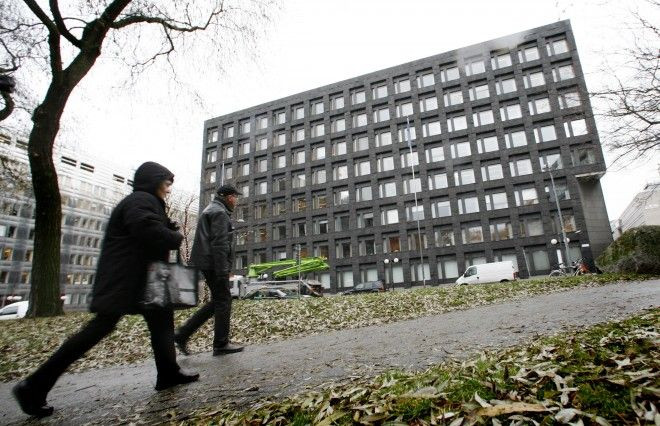Euro Crisis Forcing Central Bankers Outside Euro Zone Into Uncomfortable Stances

Except for a few notable exceptions in the fringe financial blogosphere, no one has ever said the job of a central banker is a simple one. Inscrutable, unelected and independent of higher oversight, these technocrats hold positions atop tremendously powerful government institutions.
As such, the national masters of the coin are generally also adept at wearing whatever professional hat is necessary to deal with the situation in front of them. Sometimes they're econ professors, investment bankers, speculators, policy wonks, government PR managers or national punchlines.
But as events have unfolded over the past few weeks, it seems central bankers in Japan, Sweden and Switzerland have been forced to add a new skill to their curriculum vitae: contortionist.
That's because massive movements of capital during the latest occurrences of the European financial crisis have forced these bankers to bend into positions to maintain their stated policy targets. And their antics are not being bought by all, with wagering that these bankers' next attempts at pretzeling themselves will result in a broken back or two.
Perhaps nowhere is the strange positions central bankers are being forced to take more obvious than in Zurich. There, the Swiss National Bank is pursuing a policy of actively devaluing the national currency in comparison to the euro, holding steady to a commitment not to allow trading in euro to fall under ?1.20. But the main policy tool the SNB has to do this is printing mountains of Swissie, as traders lovingly refer to the Swiss franc, and buying up euro in the open foreign exchange markets. As the euro depreciates in value to every other major world currency, that move is producing massive real losses in the bank's balance sheet.
Not to mention, that tidal wave of franc being pumped into the world economy is being harnessed by traders to make highly speculative investments in the Swiss economy, fueling a housing bubble the president of the bank recently told a German financial newspaper was giving him stomach aches. Interest in Swiss assets is so overwhelming that last week the country sold bonds with a negative coupon; instead of paying a certain amount of interest every year, they actually have a small percentage deducted from the principal lent by traders. The reason the government was able to get away with it is because investors are essentially betting the central bank's scheme will collapse soon, causing the Swiss currency to shoot up against the euro and making their franc-denominated bonds very valuable in spite of their unorthodox framework.
The bank is now openly discussing the idea of implementing capital controls to close off speculation in Swissie, although that move would tarnish the reputation of the country as an open financial center.
Farther north in Europe, the economists at Sweden's Riksbank have been less aggressive in its maneuvering but, as a result, have looked more hapless as the krona has ballooned against benchmark coins, affecting exports. Central bankers are stuck between a rock and a hard place, with moderate growth in the economy and the high level of debt held by households seemingly screaming at them to raise benchmark interest rates, while the rise in the currency such an action would cause tying their hands on the matter.
The stress this conundrum is causing in Stockholm was evident at a seminar attended by all six bankers in the Riksbank rate-setting committee earlier this month, which devolved into highly unusual public bickering between two of the economists on the committee. One, dovish Lars Svensson, answered a question from a student by noting that, if the board had accepted his proposal to lower benchmark rates by now, inflation and unemployment would have moved to more desirable levels. Barbro Wickman-Parak, and ideological opponent on the board, took offense at the public show of disunion and challenged Svensson for not being exactly crystal clear in your reasoning.
That intellectual slight might actually be a breath of civility at the other central bank being put between a rock and a hard place by the foreign exchange market. That would be the Bank of Japan, an institution that is in many ways always in a tougher spot than its peers, as it is more fundamentally structured to buckle under political pressure and, as such, is widely seen as more likely to pursue unproven, unorthodox measures. Seen as financing an unsustainable government deficit on purpose by buying up public debt, and with a benchmark interest rate at .1 percent, that bank already has little room to maneuver.
But it has seemed even more cramped in recent weeks, when speculators have pushed up the price of the yen. It has gone full-throttle, printing tens of billons of yen at a time and using that money to buy dollar-denominated assets in the stock market.
Last Friday, as the exchange rate between the euro and the yen had a massive mid-day jerk, a finance minister warned there would be pressure to intervene even more directly in the foreign exchange market, even if that miffed European and American central bank partners.
We will need to take decisive action if excessive currency moves continue, Takehiko Nakao, vice finance minister for international affairs, told Reuters.
When your job is playing God with the national economy, it seems, knowing how to bend without breaking is as important a skill as any.
© Copyright IBTimes 2024. All rights reserved.





















